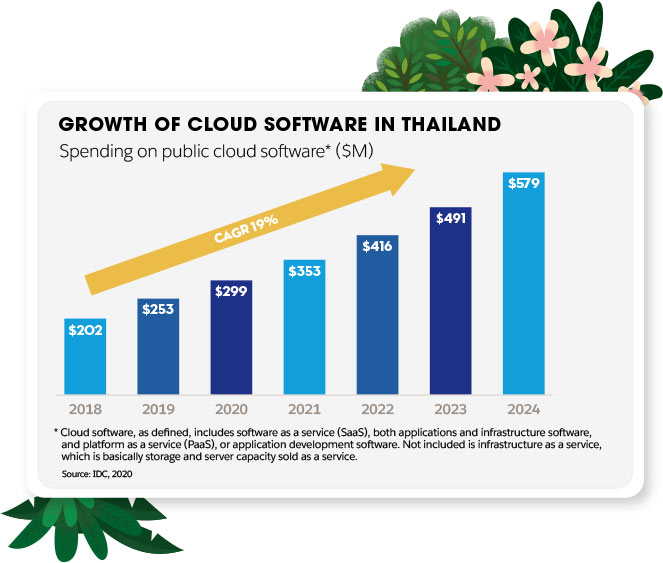Salesforce and our partners’ ecosystem will create 24,260 new local jobs by 2024. That’s what the recent addendum to The Salesforce Economic Impact white paper finds. It also projects the creation of 33,570 indirect new jobs and THB 15 billion ($1.6 billion USD) in new business revenue in Thailand between 2018 and 2024.
The data accounts for its impact and relies on updated IT and cloud software spending predictions, in light of the ongoing COVID-19 pandemic. The data also aligns with recent country GDP forecasts.
“The Salesforce ecosystem is capable of generating business and job growth, even during a pandemic,” said Sujith Abraham, SVP and General Manager for ASEAN at Salesforce. “Because we’re all working remotely, our solution — and our partner ecosystem — answers the need for digital transformation and is essential for our customers as they continue to deepen relationships, and ready for their place, in the post-pandemic economy.”
IDC estimates that, for every dollar Salesforce made in Thailand in 2020, the Salesforce ecosystem made THB 161.72 ($5.21 USD). That number increases to THB 218.83 ($7.05 USD) by 2024. The research shows every Salesforce cloud subscription sold often leads to the sale of additional and related third-party products and services. And that extra spending often exceeds the expenditure on the original subscription. In this way, the Salesforce ecosystem is expansive, more significant than Salesforce itself.
What is driving these economic benefits in Thailand?
- The growth of cloud computing is driving these economic benefits. It has and will grow 19%, from THB 6270.08 million ($202 million USD) in 2018 to THB 17972.16 million ($579 million USD) in 2024. Meanwhile, spending on non cloud software will increase by 3% over the same period.
- Between 2018-2024, there will be 24,260 new Salesforce and Salesforce customer-created local jobs.
- Over the same period, Salesforce customers’ cloud computing use will add a net THB 15 billion ($1.6 billion USD) in new business revenue to Thailand’s economy.
- Because a spend on cloud computing subscriptions also increases spend on ancillary products and services, the Salesforce ecosystem in Thailand in 2019 was 4.7 times larger than Salesforce itself. By 2024, it will be 7.1 times as big.
For over five years, IDC has predicted cloud computing’s economic benefits will free up information technology (IT) resources from routine tasks, allowing for more innovation.
Additionally, since cloud software in 2019 was 18% of software sales, the economic benefits can accrue for years to come.
 Source: IDC white paper sponsored by Salesforce, The Salesforce Economy in Thailand: 24,260 Jobs, $1.6 Billion in New Business Revenue from 2018 to 2024 (May 2020)
Source: IDC white paper sponsored by Salesforce, The Salesforce Economy in Thailand: 24,260 Jobs, $1.6 Billion in New Business Revenue from 2018 to 2024 (May 2020)
Like the rest of the world, Thailand’s enterprise organisations continue to undergo a digital transformation extending into the foreseeable future. As the pandemic continues to demand outdated systems go digital, cloud computing will grow faster than general information technology. (In fact, according to IDC’s global forecast, nearly 50% of cloud software spending in 2024 will be tied to digital transformation and related technologies.) At the same time, those enterprises also react to the uncertainty of the new post-pandemic economic environment.
Training and reskilling for the Salesforce economy
Just as cloud computing spend increases in Thailand, a workforce ready to support implementation and operations is also needed. The World Economic Forum believes significant workforce shifts will occur by 2022, with up to 35% of the current skills in demand to change. Existing workforces need training and reskilling to prevent an undesirable scenario where talent shortages accompany technological change, mass unemployment, and growing inequality. Though we, understandably, did not foresee the pandemic economy, individuals now must take a proactive approach to their lifelong learning and reskilling, and governments need to nurture these efforts.
As many business and IT executives assess the implications of these coming shifts, expansion of digital transformation through the region will impact the skills companies need. Not enough employees have the skill sets required to take on the digital changes they’ll soon have to roll out. Already, 52% of IT leaders say skill gaps are a significant challenge at their organisation.
“The pandemic ensures cloud computing spend will increase in ASEAN and beyond. And, we know job growth in the region is dependent on a skilled workforce,” said William Sim, VP Trailhead Academy, APAC at Salesforce. “That’s why Trailhead, our free online learning platform, is available for anyone who has internet access to get the skills they need to ready them for a career in the Salesforce economy.”
The extra money spent by new company employees as the Salesforce economy grows and shifts in Thailand will lead to more jobs in the retail and service sectors. And, there will be 33,570 additional jobs created in the supply and distribution chains serving those Salesforce customers. Economists call these ancillary jobs indirect or induced jobs.
Takeaways for Thai organisations using cloud software
- New working environments will speed up the adoption of cloud computing and digital transformation.
- The payoff to the broader organisation — in business agility, shaping customer experiences, and bringing new products to new markets — is more beneficial than the impact on the IT organisation.
- Successful cloud software implementations require concerted efforts (something Salesforce has unique expertise in) on the part of the customer, cloud providers, and ancillary services and products.
- Forecasts show significant returns from investment in cloud computing by 2024. Still, spending on public cloud computing in Thailand will be less than 5% of total IT spending. Which means there is an opportunity for almost unlimited cloud computing growth.
Dig into The Salesforce Economic Impact white paper and the Thai economy addendum to learn more about the Salesforce economy. Tap Trailhead to learn additional skills for the Salesforce economy.



















![[Illustration] An AI agent provides B2B customer service](https://www.salesforce.com/ap/blog/wp-content/uploads/sites/8/2024/12/B2B-AI-Agents-1680x1120-1.jpg?w=150&h=150&crop=1&quality=75)

